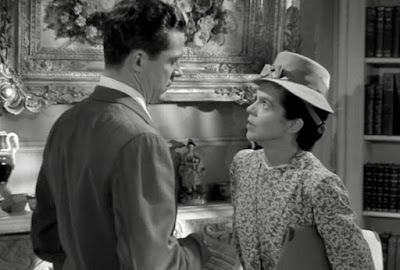Wednesday, September 28, 2022
Word Origins
Tuesday, September 27, 2022
This is Jim Rockford
Jim's answering machine: So Help Me God, 1976
Guest star: William Daniels
Monday, September 26, 2022
Reel Character Series
Her film career was winding down by the 1960s, dividing her time as a popular acting instructor at the UCLA School of Theater, Film and Television. Adams married character actor Byron Foulger (also in demand) in 1921. They remained together until his death in 1970.
Friday, September 23, 2022
That Golden Voice
Always with a singing career on his mind, he took numerous odd jobs, famously as a singing bus driver for London Transport. But he struggled to gain any ground through the Fifties. By early 1961, Monro had won ITV's A Song for Britain with "My Kind of Girl". His follow-up hits included that song, plus "Softly as I Leave You" (1962) and the title song written by John Barry for the film, From Russia with Love (1963), used over the final credits as many movie patrons were probably exiting the theater. Monro sang the Oscar-winning title song for the 1966 film, Born Free, also by Barry, which became his signature song. Monro continued to tour until just before his death.
Note: Early in his career, Monro was somewhat pigeon-holed as the "British Sinatra," perhaps due to his satirical recording, "You Keep Me Swingin" in the syncopated Sinatra style for EMI producer, George Martin and Peter Sellers album, "Songs for Swingin' Sellers." The latter chose to use it as the opening track on the record rather than record his own version, realizing he couldn't improve on Monro's performance. Sinatra once said Monro had a fabulous voice and lavished praise on his impeccable diction.
Wednesday, September 21, 2022
Word Origins
Bartlett's fourth edition (1877) of his Dictionary of Americanisms, decided that this owed its origin to a bat, or piece of wood or metal, that could be dinged, or thrown. That’s probably as good as any explanation, though the source of any bit of slang is usually highly dubious. At any rate, Americans use it, as we do its derivative, dingus, as a momentary name for anything of which the proper name is out of mind or unknown.
Tuesday, September 20, 2022
Richard Kimble's Brief Encounters
Guest stars: Tim O'Connor, Lee Grant
Monday, September 19, 2022
Reel Character Series
Frank de Kova (1910-1981) was an American character actor in films, stage, and TV, often playing a Native American or Mexican bandit in westerns, or a modern-day gangster, all befitting his craggy face.
Born Frank Campanella, it was imperative a name change was in order so there was no confusion with the film actor of the same name, the older brother of television stalwart, Joseph Campanella. As DeKova, or De Kova, or de Kova—per his grave plot—he made his Broadway debut in Detective Story and was subsequently discovered by director Elia Kazan. In Hollywood, he appeared in Viva Zapata! in 1952 as the Mexican Colonel, and played Abiram in The Ten Commandments. He appeared in three films released in 1958: Cowboy with Glenn Ford and Jack Lemmon, a quirky role in Machine Gun Kelly opposite Charles Bronson, and as the restrictive, old-school tribe counselor in Teenage Caveman, where Robert Vaughn played the cool, teen rebel with the perfect barber shop haircut. De Kova would reunite with Bronson in, The Mechanic in 1972.
De Kova was certainly most visible from his television work, including a role as Mafia hitman Jimmy Napoli in the ABC crime drama, The Untouchables, the western, Cheyenne, and a recurring role in Gunsmoke as a Kiowa Indian who is a trusted friend with Dodge City's marshal. He gained new fame as "Chief Wild Eagle" in the wacky western comedy spoof, F Troop, from 1965-1967. As the Seventies dawned, his work was less frequent, split between television and film.
Thursday, September 15, 2022
Television Talkers
Olson began his tenure as a television announcer in 1949, but few knew about it. By the Sixties, his voice was closely associated with game shows, particularly the work for Mark Goodson-Bill Todman Productions, the original To Tell the Truth and What's My Line? He spent over a decade as the announcer for both Match Game and The Price Is Right, where his high-pitched enthusiastic, "Come on down!" became legendary and often parodied. From 1962 to 1970, he was the announcer for The Jackie Gleason Show. During the peak of his announcing duties in the 1970s and early 1980s, his distinct voice was heard on more than six other game show productions.
Wednesday, September 14, 2022
Word Origins
Although one authority cites a purported Southern United States meaning of “a sharp blow on the shins,” this may only be a transferred meaning, from the appearance of the word to an accidental kick received during a spirited dance or party. It seems much more likely that a shindig is a US alteration of the much older British word shindy, which is preceded by shinty and shinny. This last is a ball game of the seventeenth century or older that somewhat resembles field hockey. Its name may have been derived from a call used in the game, “Shin ye! Shin you!” or from the Gaelic sinteag, “a skip, jump.”
Note: The ABC music variety show, Shindig!, was broadcast from 1964 to 1966 and featured many high-profile bands and soloists. The show had competition from NBC's Hullabaloo, which began in 1965.
Wednesday, September 7, 2022
Word Origins
*Inspired by Charles Funk (1881–1957)











